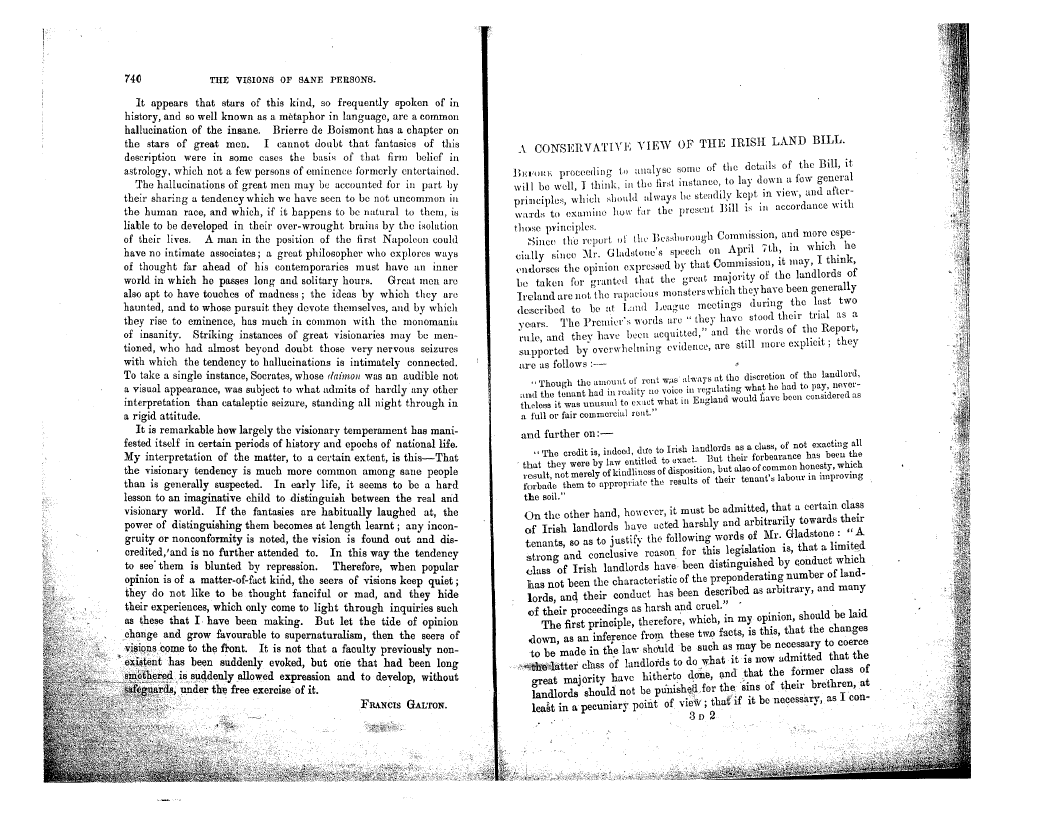OCR Rendition - approximate740 THE VISIONS Or SANE PERSONS.
It appears that stars of this kind, so frequently spoken of in
history, and so well known as a metaphor in language, are a common hallucination of the insane. Brierro de Boismont has a chapter on the stars of great men. I cannot doubt that fantasies of this description were in some cases the basis of that firm belief in astrology, which not a few persons of eminence formerly entertained.
The hallucinations of great men may be accounted for in part by their sharing a tendency which we have seen to be not uncommon in the human race, and which, if it happens to be natural to them, is liable to be developed in their over-wrought brains by the isolation of their lives. A man in the position of the first Napoleon could have no intimate associates ; a great philosopher who explores ways of thought far ahead of his contemporaries must have an inner world in which ho passes long and solitary hours. Great men are also apt to have touches of madness ; the ideas by which they arc haunted, and to whose pursuit they devote themselves, and by which they rise to eminence, has much in common with the morornania of insanity. Striking instances of great visionaries may be mentioned, who had almost beyond doubt those very nervous seizures with which the tendency to hallucinations is intimately connected. To take a single instance, Socrates, whose daimon was an audible not a visual appearance, was subject to what admits of hardly any other interpretation than cataleptic seizure, standing all night through in a rigid attitude.
It is remarkable how largely the visionary temperament has manifested itself in certain periods of history and epochs of national life. My interpretation of the matter, to a certain extent, is this-That the visionary tendency is much more common among sane people than is generally suspected. In early life, it seems to be a hard lesson to an imaginative child to distinguish between the real and visionary world. If the fantasies are habitually laughed at, the power of distinguishing them becomes at length learnt ; any incongruity or nonconformity is noted, the vision is found out and discredited,'and is no further attended to. In this way the tendency to see' them is blunted by repression. Therefore, when popular opinion is of a matter-of-fact kind, the seers of visions keep quiet ; they do not like to be thought fanciful or mad, and they hide their experiences, which only come to light through inquiries such as these that I have been making. But let the tide of opinion change and grow favourable to supernaturalism, then the seers of visions come to the front. It is not that a faculty previously nonexistent has been suddenly evoked, but one that had been long smothered is suddenly allowed expression and to develop, without safeguards, under the free exercise of it.
FRANCIS GAL'roN.
CONSERVATIVE VIEW OF THE IRISH LAND BILL.
Ibo on proceeding to analyse some of the details of the Bill, it will be well, I think, in the first instance, to lay clown a few general principles, which ahondd always be steadily kept in view, and afterwards to examine how far the present Bill is in accordance with those principles.
Since the report of Ilie Beesboro,gh Commission, and more especially since -Mr. Gladstone's speech on April 7th, in which he endorses the opinion expressed by that Commission, it may, I think, be taken for granted that the great majority of the landlords of Ireland arc not the rapacious monsterswhich they have been generally described to be at laud League meetings during the last two years. The Premier's words are " they have stood their trial as a rule, and they have been acquitted," and the words of the Report, supported by overwhelming evidence, are still more explicit ; they
are us follows :-- .,
"Though the amount of rout woes always at the discretion of the landlord, and the tenant bad in reality no voice is regulating what ho had to pay, nevertheless it was unusual to exact what in England would have been considered as
a full or fair commercial rout."
and further on:
The credit is, indeed, due to Irish landlords as a class, of not exacting all that they were by law entitled to exact. But their forbearance has been the result, not merely of kindliness of disposition, but also of common honesty, which forbade them to appropriate the results of their tenant's labour in improving
the soil."
On the other band, however, it must be admitted, that a certain. class of Irish landlords have acted harshly and arbitrarily towards their tenants, so as to justify the following words of Mr. Gladstone : "A strong and conclusive reason for this legislation is, that a limited class of Irish landlords have been distinguished by conduct which has not been the characteristic of the preponderating number of landlords, and their conduct has been described as arbitrary, and many of their proceedings as harsh and cruel." '
The first principle, therefore, which, in my opinion, should be laid down, as an inference from these two facts, is this, that the changes to be made in the law should be such as may be necessary to coerce
latter class of landlords to do what it is now admitted that the
great majority have hitherto done, and that the former class of
landlords should not be punished. for the sins of their brethren, at least in a pecuniary point of view ; that if it be necessary, as I con
3n2
|

